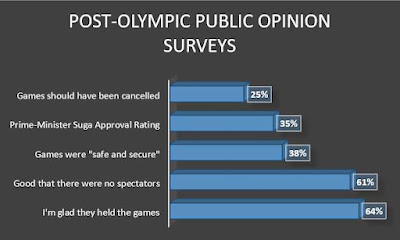In the June post, I wrote (pre-Games) about why the Japanese didn't want the Olympics; now the Games have finished, a lot of people have been asking what the prevailing mood and sentiment is now. I can probably sum this up in two-words: "mixed-feelings." On the one hand, Japan's record medal haul (including 27 golds) certainly got people excited and proud, especially success in "traditional" events like judo in which Japan has under-performed in recent years. On the other hand, during the Olympics we saw a huge spike in COVID-19 cases: as I write, we are at a record 25,000 cases a day (including a record number of serious cases), including almost 5,000 new cases daily in Tokyo, with medical infrastructure seriously stretched and ambulances unable to find beds for patients. Below, I'll look at these two sides in turn.
The strong performance of Japanese athletes - by far surpassing the previous record haul of 16 golds in 1964/2004 - saw a large number of people (64%) glad the Olympics went ahead (kaisai sarete yokatta=開催されてよかった). The number who thought the games should have been cancelled (25%) was also much lower than before the games (in my pre-olympic post numbers hovered around 40%).On the other hand, Prime-Minister Suga's approval rating reached a new low (35%) with many sceptical of his insistence that the Olympics were not to blame for the spike in cases. Certainly, the scepticism was a little unfair since the Olympic bubble, aside from a few infractions, more or less held: an incredible 624,000 PCR tests were conducted with only 138 positives (0.02%), including 29 athletes. No events were disrupted. The Organising Committee announced over 550 COVID-19 cases connected to the Games in total, the high figure perhaps reflecting the thoroughness of the testing. But while the bubble did succeed for the most part in stopping infections from the 80,000 or so visitors, as Shigeru Omi, Japan's Fauci, argued the Olympic atmosphere undoubtedly contributed to a rise in public complacency. The result was a huge spike in cases that forced the government to extend the (4th) state of emergency on August 2nd and further on August 20th.
The mood hasn't been helped by news that the government covered up the first case of the deadly Lambda variant of the coronavirus identified in Japan which was brought by an Olympic worker from Peru in July. And the story of a newborn baby who died after the coronavirus infected mother couldn't find a hospital to accept her and was forced to give birth at home received blanket coverage and shocked many Japanese to the core. In sum, distrust in the government really couldn't be higher - expect the LDP to crash and burn in the upcoming House of Representatives elections - assuming, that is, Suga is still at the helm after the LDP leadership election on September 29th.
UPDATE: Suga announced he was stepping down on September 3rd, continuing the "Olympic jinx" that has seen every prime-minister quit the year the (Summer/Winter) Olympics were held in Japan: 1964, 1972, 1998, and now 2021.
 |
| The Spectator-less (new) National Stadium (Kokuritsu Kyōgijō=国立競技場). Thanks to L for the fantastic pictures. |


